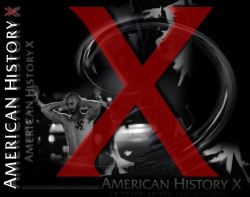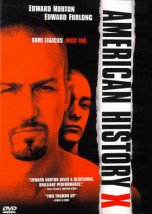|
American History
X
|
| |
 |
USA,
1998. Rated R. 117 minutes.
Cast: Edward Norton, Edward Furlong,
Beverly D'Angelo, Jennifer Lien, Avery Brooks, Elliot Gould, Stacy Keach,
Ethan Suplee, Fairuza Balk, Guy Torry, William Russ
Writer: David McKenna
Music: Anne Dudley
Cinematographer: Tony Kaye
Producers: John Morrissey
Director: Tony Kaye
|
| Grade: A |
Review
by Carlo Cavagna |


n
American History X, Edward Norton delivers a riveting, screen-chomping
performance as Derek Vinyard, a reformed neo-Nazi skinhead just out of jail
who, with the
help of high school principal Bob Sweeney (Avery Brooks),
tries to prevent his younger brother Danny (Edward Furlong) from following in
his footsteps. Derek's story, of how he joined the skinheads and eventually
wound up in jail, is told with flashbacks.
American History X functions primarily on the strength of Edward Norton's
acting and director/cinematographer Tony Kaye's visuals. Edward Norton
should earn another Oscar nomination for his work here [Ed. note--as,
indeed, he did after this review was written]. Because of Norton's incredible
ability to transform himself, Derek's improbable character development is more
believable than perhaps it ought to be. American History X is not
for the squeamish, but for everybody else, it's a must see.
The film critics were not unanimous in their praise, however. Two criticisms,
in particular, were leveled at American History X:
1) American History X glorifies the views it purports to condemn.
It's hard to see how. There are numerous scenes of Derek eloquently spouting
neo-Nazi philosophy, which is what the critics are objecting to, I suppose. Or
perhaps the critics are referring to the fact that there is also a great deal
of moral ambiguity. Certainly, it would have been easy to populate the
story with only 100%-negative white characters and angelic minority victims. It
would have been politically safe to sprinkle in a generous amount of lecturing
on the evils of racial hatred.
American History X chooses a more challenging and realistic road. For
the most part, it avoids the lecturing and lets the characters' experiences
do the talking. It portrays minority characters who are, in fact, negative,
along with several positive ones. Because American History X attempts
to capture the twisted appeal of hate groups, there are certain scenes that
could be misinterpreted if taken out of context. In the end, though, the
message of American History X could not be more clear: you reap what
you sow.
AboutFilm.Com
The Big Picture
|
| Carlo |
A
|
| Alison |
A
|
| Kris |
B+
|
| Jen |
B+
|
| Dana |
A-
|
| Jeff |
B+
|
2) The character development is implausible and contrived.
As I've already indicated, this criticism is perhaps more justified. Derek's
change from Evil White Supremacist to Enlightened Guy in prison seems extreme,
but it is explained well--certain things happen to Derek that would change anyone. Furthermore,
in a dramatic confrontation with his former Nazi mentor (Stacy Keach), we see
clear evidence that certain elements of Derek's nature are still the same. What
is unclear is how Derek originally changed from Shy Young Honors Student to
Evil White Supremacist. We're shown two scenes--a dinner conversation with
his bigoted father and Derek's reaction to his father's murder in a television
interview--but these are insufficient and poorly written. This is a minor problem,
however, that does not detract from the film's overall impact.
American History X was released in the midst of a bit of a soap opera. After
a power struggle over the film editing--during which New Line Cinema took control
of the film from director Tony Kaye, hired respected editor Jerry Greenberg,
and brought Norton into the editing booth to help--Kaye publicly denounced the
movie (via numerous interviews and bizarre ads in trade magazines), called Norton
a "narcissistic dilettante," and unsuccessfully attempted to remove his name
from the credits. Apparently the conflict began when Kaye failed repeatedly
to produce a final version of the film and demanded to do numerous reshoots
long after production wrapped. His justification was that "Stanley Kubrick
is allowed to do it." Of course, Stanley Kubrick is not a first-time feature
film director who has done commercials all his life.
Fortunately, the final product is nowhere near the disaster Kaye proclaimed
it to be. Despite the presence of flaws, American History X is
a powerful piece of filmmaking. For Kaye to disown it is irrational beyond
belief.
Review
© January 1999 by AboutFilm.Com and the author.
Images © 1998 New Line Productions, Inc. All rights reserved.



